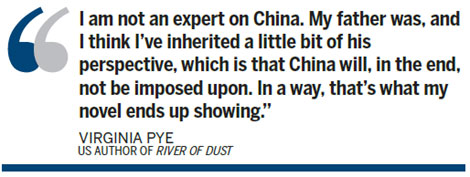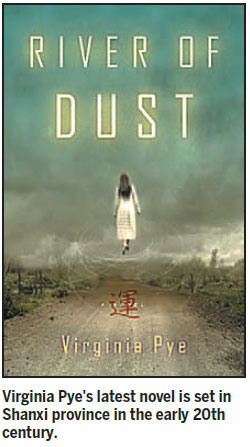A writer from the United States had strong family ties to China but had never been to the mainland herself before writing her book, River of Dust, set in Shanxi province. Matt Hodges reports in Shanghai.
In her debut novel River of Dust, Virginia Pye seems to agree with Pulitzer Prize-winning author Pearl S. Buck on at least one point: The missionaries who came to China in the early 20th century to spread the gospel were not necessarily needed.
Like Buck, Pye's forebears were tasked with converting non-believing Chinese to Christianity.
|
US author Virginia Pye shares with Chinese readers the genesis and inspiration of her latest novel River of Dust at the Shanghai International Literary Festival. Provided to China Daily |

But Pye's novel, set in northern Shanxi province, is a breezier read than The Good Earth. Using pared-down prose and a simple, old-world vernacular, it questions the validity of religious belief and explores the master-slave relationship, as well as what Pye calls "unarticulated inheritances".
Set a decade after the Boxer Rebellion (1898-1900), River of Dust tells the story of a US missionary - only referred to as "The Reverend" or "Ghost Man" - and his wife Grace as they attempt to find their son who is abducted by Mongolian bandits.
The author drew inspiration from her grandfather's journals and sepia-tinted photographs of the landscape, but the plot is pure fabrication.
"My grandparents would not approve of it, I'm sure. Yet it's my version of our family story," she says.
She explained the genesis of the novel, and how she could write about a distant time and a country she had never visited, at an event hosted by M on the Bund on March 9. This was part of the Shanghai International Literary Festival, which runs until March 21.
The other two main characters in the book are Chinese house servants, although they often come across more like adoptive parents of their foreign wards.
"They're both very eccentric, in their own ways, but they play a very important role in the book because they end up being the ones readers can trust more," Pye says.
Many have found themselves drawn to the no-nonsense nature of Mai Lin, Grace's maid and midwife. The elderly woman proves more than a match for Ahcho, a recent Christian convert, when they verbally spar.
"Mai Lin is quite an entertaining character, yet is also very clear-eyed," Pye says. "What we start to see, bit by bit, is that the American characters aren't really seeing the situation around them clearly. When they get more and more confused about things, she's the one who speaks the truth."

Among the book's selling points are its exotic locales: Chinese opium dens, dusty plains and Mongolian circuses, set against a background of drought and famine.
Pye says that vague memories from a year spent in Hong Kong as a toddler helped her, and "filtered down to these fictional characters".
"I remember riding on the shoulders of a houseboy through old Hong Kong alleyways ... and feeling very welcome," she says. "Another thing that surprised me yesterday as I was walking around (Shanghai) was how oddly familiar it felt, and yet I've never actually been here."
She was further inspired by the trinkets that two generations of her ancestors brought back from China. Her father, Lucian W. Pye, grew up under Japanese colonial rule and returned to work for the US marines in Beijing. A prominent Sinologist, he wrote more than 20 books on China and Asia.
"The final impetus to write my novel was (my grandfather's) eloquence, and the language of that time, and I wanted to mimic that, in my own voice," she says.
While this may evoke other books, such as Charles Frazier's Cold Mountain, another piece of historical fiction inspired by the author's great-great uncle during the US Civil War, River of Dust is a different beast. It paints in broader strokes and contrasts the perspectives of characters from different worlds. Each chapter is told from the point of view of one of the main four characters.
Those looking for a female American writer's take on the kind of subject matter dealt with in Jiang Rong's Wolf Totem would also be mistaken. River of Dust belongs as much to what Pye calls "the China of my mind" as to the real world of the past.
Yet its thematic content resonates at a time when - at least from China's perspective - the West is still trying to impose its views on the country.
"My grandparents held the colonial perspective that they were going to come here and change the world, and improve things," she says.
"I am not an expert on China. My father was, and I think I've inherited a little bit of his perspective, which is that China will, in the end, not be imposed upon. In a way, that's what my novel ends up showing.
"I read a lot of colonial literature to try and understand (this)," she adds. "So I tried to write my own Heart of Darkness, you could say, in a different setting."
Impressed by the prescience of her grandfather's observations - he predicted an imminent shift in the balance of power from West to East - Pye read excerpts from his journals during her talk.
The following quote reveals his opinion of the Chinese: "Their physique is excellent. They can live anywhere, and certain sections of them are disposed to immigrate; they are civilized, laborious and excellent men of business; why have so large and gifted a people not conquered the world?"
River of Dust is Pye's sixth written novel and her first published book. She wrote it - a distilled and re-imagined version of a much longer project - in 28 days.
It hit US shelves in May 2013 and is available to English-speaking readers in China on Amazon. It is also on Kindle and Nook.
Pye has met with publishers in Shanghai to discuss a Chinese translation. She is now working on another novel set in China in 1937 with a female American protagonist.
Contact the writer at matthewhodges@chinadaily.com.cn.
(China Daily 03/18/2014 page22)